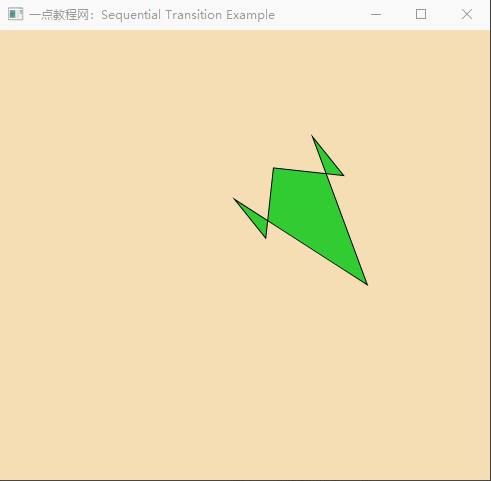JavaFX SequentialTransition类
此转换用于按顺序(一个接一个)在节点上应用动画列表。顺序转换对于设计按顺序为其实体设置动画的游戏很重要。
在 JavaFX 中,类 javafx.animation.SequentialTransition 用于表示顺序转换。我们需要将多个过渡对象的列表传递给这个类的构造函数。这些动画将按顺序应用在节点上(按顺序,它们被传递到构造函数中)。
1 SequentialTransition类的属性
| 属性 | 描述 | setter方法 |
|---|---|---|
| node | 它是类 Node 的对象类型属性。它表示要应用转换的节点。 | setNode(Node node) |
2 SequentialTransition类的构造函数
该类包含下面给出的四个构造函数。
- public SequentialTransition() :使用默认参数创建一个 SequentialTransition 实例。
- public SequentialTransition(Animation?children) :创建一个带有动画列表的 SequentialTransition 实例。
- public SequentialTransition(Node node) :使用将应用顺序转换的指定节点创建一个sequentialTransition 实例。
- public SequentialTransition(Node node, Animation?children) :使用指定的节点和动画列表创建一个 SequentialTransition 的实例。
3 SequentialTransition类的例子
在以下示例中,我们创建了一个多边形并按顺序对其应用了各种过渡。
package com.yiidian;
import javafx.animation.*;
import javafx.application.Application;
import javafx.scene.Group;
import javafx.scene.Scene;
import javafx.scene.paint.Color;
import javafx.scene.shape.Polygon;
import javafx.stage.Stage;
import javafx.util.Duration;
public class SequentialTransitionExample extends Application {
@Override
public void start(Stage primaryStage) throws Exception {
Polygon poly = new Polygon();
//Setting points for the polyogn
poly.getPoints().addAll(new Double[] {320.0,270.0,270.0,220.0,270.0,270.0,320.0,120.0,370.0,270.0,370.0,220.0});
//Setting Color and Stroke properties for the polygon
poly.setFill(Color.LIMEGREEN);
poly.setStroke(Color.BLACK);
//Setting durations for the transitions
Duration dur1 = Duration.millis(1000);
Duration dur2 = Duration.millis(500);
//Setting the pause transition
PauseTransition pause = new PauseTransition(Duration.millis(1000));
//Setting the fade transition
FadeTransition fade = new FadeTransition(dur2);
fade.setFromValue(1.0f);
fade.setToValue(0.3f);
fade.setCycleCount(2);
fade.setAutoReverse(true);
//Setting Translate transition
TranslateTransition translate = new TranslateTransition(dur1);
translate.setToX(-150f);
translate.setCycleCount(2);
translate.setAutoReverse(true);
//Setting Rotate Transition
RotateTransition rotate = new RotateTransition(dur2);
rotate.setByAngle(180f);
rotate.setCycleCount(4);
rotate.setAutoReverse(true);
//Setting Scale Transition
ScaleTransition scale = new ScaleTransition(dur1);
scale.setByX(1.5f);
scale.setByY(1.2f);
scale.setCycleCount(2);
scale.setAutoReverse(true);
//Instantiating Sequential Transition class by passing the list of transitions into its constructor
SequentialTransition seqT = new SequentialTransition (poly,rotate, pause, fade, translate, scale);
//playing the transition
seqT.play();
//Configuring the group and scene
Group root = new Group();
root.getChildren().addAll(poly);
Scene scene = new Scene(root,490,450,Color.WHEAT);
primaryStage.setScene(scene);
primaryStage.setTitle("一点教程网:Sequential Transition Example");
primaryStage.show();
}
public static void main(String[] args) {
launch(args);
}
}
输出结果为:

热门文章
优秀文章


